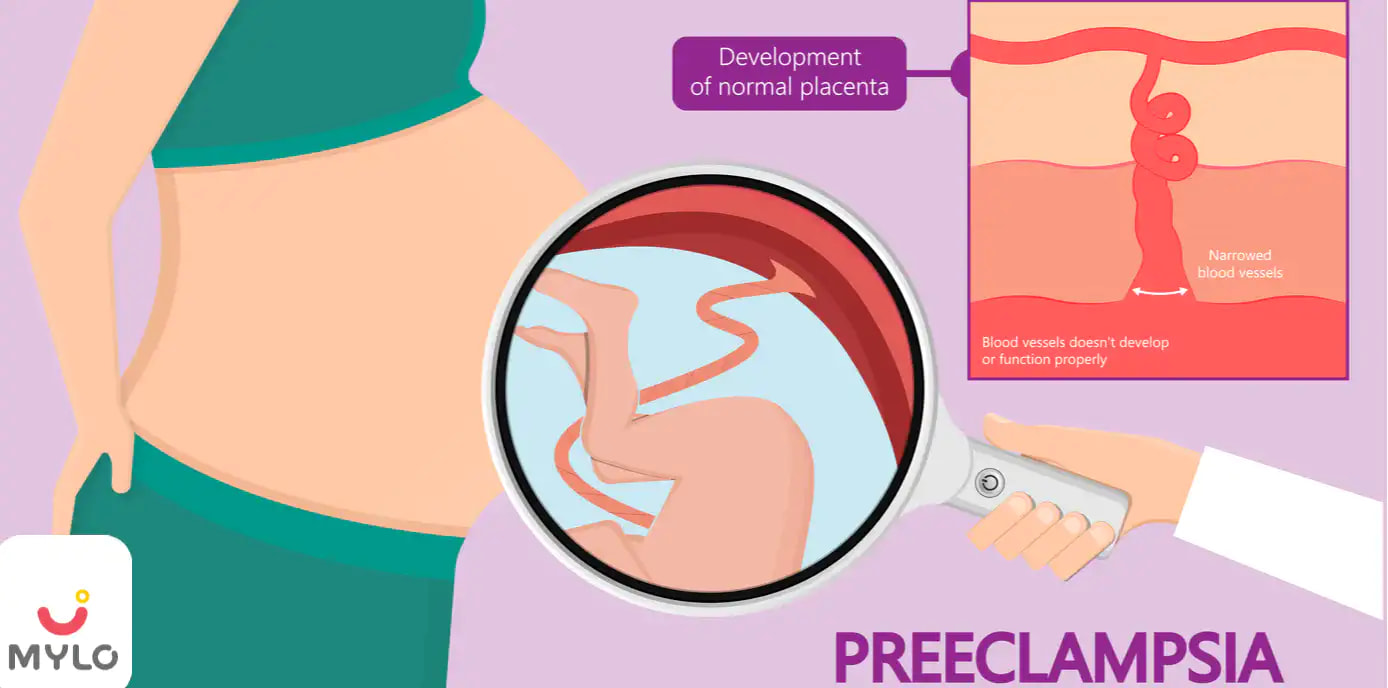Home

Pregnancy Journey

How to Check Pulse Rate During Pregnancy?
In this Article

Pregnancy Journey
How to Check Pulse Rate During Pregnancy?
Updated on 3 November 2023



Medically Reviewed by
Dr. Shruti Tanwar
C-section & gynae problems - MBBS| MS (OBS & Gynae)
View Profile

Pregnancy is a time of great change in a woman's body. With so many physiological changes taking place, it is important to monitor one's health and well-being closely. One simple and effective way to do this is by checking your pulse rate regularly. Pulse rate is a measure of the number of times the heart beats per minute, and it is a key indicator of cardiovascular health. In this article, we will explore how to check pulse rate during pregnancy, why it is important, and what the results can tell you about your overall health.
Pregnancy and cardiac function
The cardiac function of an expecting mother significantly alters while she is carrying. Heart rate, cardiac output, and blood volume are all affected. When you are pregnant, your heart has to work harder because the heart has to pump more blood to your uterus as the fetus grows. The uterus receives one-fifth of your pre-pregnancy blood flow towards the end of the pregnancy.
A non-pregnant woman's heart rate or pulse rate should be between 60 and 100 beats per minute—however, the pulse rate rises by 15 to 20 beats per minute on average during pregnancy. The majority of this rise occurs in the first trimester and continues throughout the pregnancy. The amount of blood pumped by the heart, also called cardiac output, rises by 30 to 50%.
Between 28 to 32 weeks, cardiac output usually reaches its peak. However, during childbirth, cardiac output increases by another 30%. Immediately postpartum, cardiac output increases but approximately six weeks following delivery, the cardiac output returns to pre-pregnancy levels.
What is the normal pulse rate in pregnancy?
During pregnancy, the normal pulse rate can vary depending on the stage of pregnancy. In general, the pulse rate during pregnancy can increase by 10-20 beats per minute due to hormonal and physiological changes. The normal pulse rate during pregnancy is between 60-100 beats per minute. However, it's important to discuss any concerns about your pulse rate with your healthcare provider, as they can monitor your heart rate and ensure that it stays within a safe range throughout your pregnancy.
How to check pulse rate during pregnancy?
There are at least four ways for you to check your pulse rate without the assistance of a monitoring device. The four methods are as follows:
1. The radial pulse method
The radial pulse method involves the feeling of the blood pumping through your radial artery, which is situated in your wrist. It is the easiest method.
- The first step is to locate your radial artery. This is done by placing your pointer and middle fingers directly below the thumb inside your opposite wrist.
- Secondly, you should avoid checking your pulse with your thumb since the artery in your thumb can make it difficult to count precisely.
- Count how many beats you feel in 15 seconds once you can feel your pulse.
- To calculate your heart rate, multiply this value by four. For example, a heart rate of 80 beats per minute equals 20 beats in 15 seconds.
You may also like: Palpitation in Pregnancy: Symptoms, Causes & Treatment
2. The carotid pulse method
The carotid pulse method involves feeling your blood pumping through your carotid artery located in your neck region. This method shows you how to check your pulse in the neck.
- As always, the first step is to locate the right artery. Place your pointer and middle fingers right below the jawbone on the side of your windpipe. You may need to move your fingers around until you can feel your heart pounding clearly.
- For 15 seconds, count the pulses you feel.
- To calculate your heart rate, multiply this value by four.
You may also like: How often should you check thyroid levels during pregnancy?
3. The pedal pulse method
The pedal pulse is checked from the top of your foot.
- First, lie down on your back if you cannot bend down to check your pulse in a seated position.
- Place your index and middle fingers just above the bone that runs down the top of your foot. You may need to move your fingertips along the bone or slightly to either side to feel the pulse.
- After you've found your pulse, count the beats for 15 seconds.
- Multiply the number by four.
You may also like: Late Heartbeat in Pregnancy
4. The Brachial pulse method
This method involves checking your pulse rate during pregnancy from the brachial artery.
- Turn your arm such that your inner arm is looking up toward the ceiling and your outer arm is slightly bent.
- Between the crook of your elbow on top and the sharp section of your elbow bone on the bottom, place your index and middle fingers along the side of your arm. Then move your fingers up your arm 1 inch. To feel your pulse, you may need to press down hard.
- Count the number of beats for 15 seconds once you feel your pulse
- Multiply the number by 4.
You may also like: 7 Labor Signals That Can Tell You That Your Little One Might Make an Appearance Soon
FAQs
1. How to find pregnancy with hand pulse?
If you're wondering how to check pregnancy by pulse, then it's important to note that this method isn't a reliable method of confirming pregnancy. However, there are some changes in the body that may be associated with pregnancy, such as an increase in resting heart rate.
2. Is it normal to have a high pulse rate in pregnancy?
It is common to experience an increase in resting heart rate during pregnancy, which can result in a higher pulse rate. This is due to the increased volume of blood that the heart needs to pump to support both the mother and the growing fetus.
Conclusion
Although it is true that your heart rate increases by 15 to 20 beats per minute, it is vital to ensure that no limits are crossed, even the new heart rate has an upper limit and a lower limit which are ideal for your body to sustain. Anything above or below these limits could be unhealthy and could indicate how close you are to your delivery or even of unfavourable health conditions. This can be done by checking your pulse rate. Your pulse rate could give you a good idea about your overall health. Make sure you know how to check pulse rate during pregnancy, if the need arises.
References
1. Odendaal H, Groenewald C, Myers MM, Fifer WP. (2018). Maternal heart rate patterns under resting conditions in late pregnancy. NCBI
2. Loerup, L., Pullon, R.M., Birks, J. et al. (2019). Trends of blood pressure and heart rate in normal pregnancies: a systematic review and meta-analysis. BMC Med
Popular Articles:
How To Check Pregnancy With Salt | How Doctors Check Pregnancy | How To Use Condom Properly To Avoid Pregnancy | Female Condoms How Does It Work
Trending Articles:
How To Use Female Condoms Correctly | How To Prevent Pregnancy After Sex | How To Stop Pregnancy After Sex Naturally | When Spotting Occurs During Early Pregnancy





Medically Reviewed by
Dr. Shruti Tanwar
C-section & gynae problems - MBBS| MS (OBS & Gynae)
View Profile


Written by
Priyanka Verma
Priyanka is an experienced editor & content writer with great attention to detail. Mother to an 11-year-old, she's a ski
Read MoreGet baby's diet chart, and growth tips

Related Articles
Related Topics
RECENTLY PUBLISHED ARTICLES
our most recent articles

Diet & Nutrition
গর্ভাবস্থায় আলুবোখরা: উপকারিতা ও ঝুঁকি | Prunes During Pregnancy: Benefits & Risks in Bengali

Diet & Nutrition
গর্ভাবস্থায় হিং | ঝুঁকি, সুবিধা এবং অন্যান্য চিকিৎসা | Hing During Pregnancy | Risks, Benefits & Other Treatments in Bengali

Women Specific Issues
স্তনের উপর সাদা দাগ: লক্ষণ, কারণ এবং চিকিৎসা | White Spots on Nipple: Causes, Symptoms, and Treatments in Bengali

Diet & Nutrition
গর্ভাবস্থায় পোহা: উপকারিতা, ধরণ এবং রেসিপি | Poha During Pregnancy: Benefits, Types & Recipes in Bengali

Diet & Nutrition
গর্ভাবস্থায় মাছ: উপকারিতা এবং ঝুঁকি | Fish In Pregnancy: Benefits and Risks in Bengali

Diet & Nutrition
গর্ভাবস্থায় রেড ওয়াইন: পার্শ্ব প্রতিক্রিয়া এবং নির্দেশিকা | Red Wine During Pregnancy: Side Effects & Guidelines in Bengali
- ইনার থাই চ্যাফিং: কারণ, উপসর্গ এবং চিকিৎসা | Inner Thigh Chafing: Causes, Symptoms & Treatment in Bengali
- গর্ভাবস্থায় ব্রাউন রাইস: উপকারিতা ও সতর্কতা | Brown Rice During Pregnancy: Benefits & Precautions in Bengali
- Velamentous Cord Insertion - Precautions, Results & Safety
- Unlock the Secret to Flawless Skin: 7 Must-Have Qualities in a Face Serum
- Unlock the Secret to Radiant Skin: How Vitamin C Serum Can Transform Your Complexion
- Gender No Bar: 10 Reasons Why Everyone Needs a Body Lotion
- Unlock the Secret to Radiant Skin How to Choose the Perfect Body Lotion for Your Skin Type
- Top 10 Reasons to Apply a Body Lotion After Every Bath
- Communication in Toddlers: Milestones & Activities
- How to Improve Vocabulary for Toddlers?
- A Comprehensive Guide to Understanding Placenta Accreta
- Vulvovaginitis in Toddlers Causes, Symptoms and Treatment
- A Comprehensive Guide to Understanding Cerebral Palsy in Children
- Bitter Taste in Mouth During Pregnancy: Understanding the Causes and Remedies


AWARDS AND RECOGNITION

Mylo wins Forbes D2C Disruptor award

Mylo wins The Economic Times Promising Brands 2022
AS SEEN IN

- Mylo Care: Effective and science-backed personal care and wellness solutions for a joyful you.
- Mylo Baby: Science-backed, gentle and effective personal care & hygiene range for your little one.
- Mylo Community: Trusted and empathetic community of 10mn+ parents and experts.
Product Categories
Baby Carrier | Baby Soap | Baby Wipes | Stretch Marks Cream | Baby Cream | Baby Shampoo | Baby Massage Oil | Baby Hair Oil | Stretch Marks Oil | Baby Body Wash | Baby Powder | Baby Lotion | Diaper Rash Cream | Newborn Diapers | Teether | Baby Kajal | Baby Diapers Pants | Cloth Diapers | Laundry Detergent | Lactation Granules |








